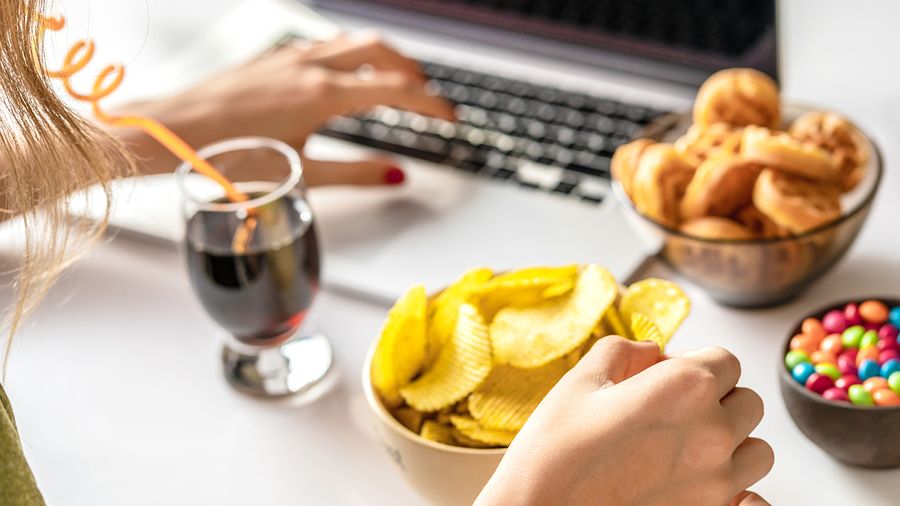Pandemic forcing food to your emotional rescue

Feeling stressed? Find yourself reaching for the snack drawer or refrigerator?
It’s not uncommon for people to grab a snack when they’re feeling stressed or experiencing anxiety. But with the recent uncertainly caused by the COVID-19 pandemic, people might find themselves reaching for that stress snack more often than not.
“The COVID-19 pandemic has caused huge shifts in the way we live, work and socialize,” said Amy Reichelt, a BrainsCAN Postdoctoral Fellow at Western’s Schulich School of Medicine & Dentistry studying the impact of diet on the brain. “Stress is your body’s natural response to situations that threaten your well-being.”
What is stress eating?
Stress eating, or emotional eating, occurs when someone consumes comfort foods to subdue negative emotions like anger, anxiety, fear, boredom, sadness or loneliness. It might result in people consuming food more regularly, or eating larger amounts for meals.
“Stress eating can manifest as overeating or binge-eating,” said Reichelt, a Robarts Research Institute researcher. “Others may notice a 'grazing' behaviour where they want to eat constantly regardless of hunger – this is because eating can provide a welcome distraction from the situation that we are currently facing, and can provide a coping mechanism during uncertain times.”
While some overeat, others manage times of stress by focusing on control.
“Some people may restrict their eating as a control mechanism during a time of uncertainty,” added Reichelt. “Fear around the availability, accessibility and cost of future food can cause people to hoard or store foods unnecessarily, and form strong emotional ties to specific foods.”
Why does the brain crave unhealthy foods during times of stress?
Stress impacts the brain during normal circumstances, but chronic stress has been shown to affect brain functions including cognition, attention and memory. When someone is feeling stressed, the brain jumps into action.
“A stressed-out brain needs more energy to fuel neurons, which need glucose,” Reichelt said. “The adrenal glands release cortisol to increase blood glucose, and adrenaline makes sure the glucose gets to the brain. But the rebound effect of stress is low blood sugar, resulting in headaches, irritability and poor judgement.”
The outcome? People tend to reach for more sugary foods including chocolate, chips and candy. These high-energy carbohydrates replenish glucose levels, and also release dopamine – involved in the brain’s reward system.
“This release of dopamine in the brain from eating carbohydrate-rich foods is rewarding, and can soothe negative feelings caused by stressful experiences. We learn that rewarding foods can make us feel good, and that they are an acceptable treat in unpleasant times.”
What can we do to avoid stress eating?
With increased anxiety around an uncertain future, and easy access to food for those now isolating at home, the COVID-19 pandemic has created an environment that encourages stress eating. People reaching for comfort foods should know they’re not alone – it’s the body’s natural response to stress.
“Eating is a natural coping mechanism to help us deal with situations that make us feel anxious,” Reichelt said.
For those looking to curb this form of eating and focus on healthy alternatives instead, understanding how junk foods affect the brain is a start.
“We know that excessive consumption of junk foods can impair cognitive functions, such as learning and memory. Junk food diets are also linked to increased anxiety and mental health issues by reducing neuroplasticity and increasing inflammation in the brain.”
To help satisfy eating-related urges, Reichelt recommends having healthy snacks on hand like fruits, vegetables and nuts. These snacks are nutritious alternatives to sugary junk foods and are also good for the brain, particularly omega-3 rich walnuts and antioxidant-filled berries.
If avoiding junk foods is difficult, Reichelt suggests trying non-food related distractions such as watching a movie (without the buttered popcorn), reading a book, going outside for a walk, doing crafts or writing a message to a friend.
“Yoga and exercise have been shown to help with stress management. As has cuddling your pets,” she said. “But remember to be kind to yourself; in the current environment, feelings of anxiety are felt by all.”






